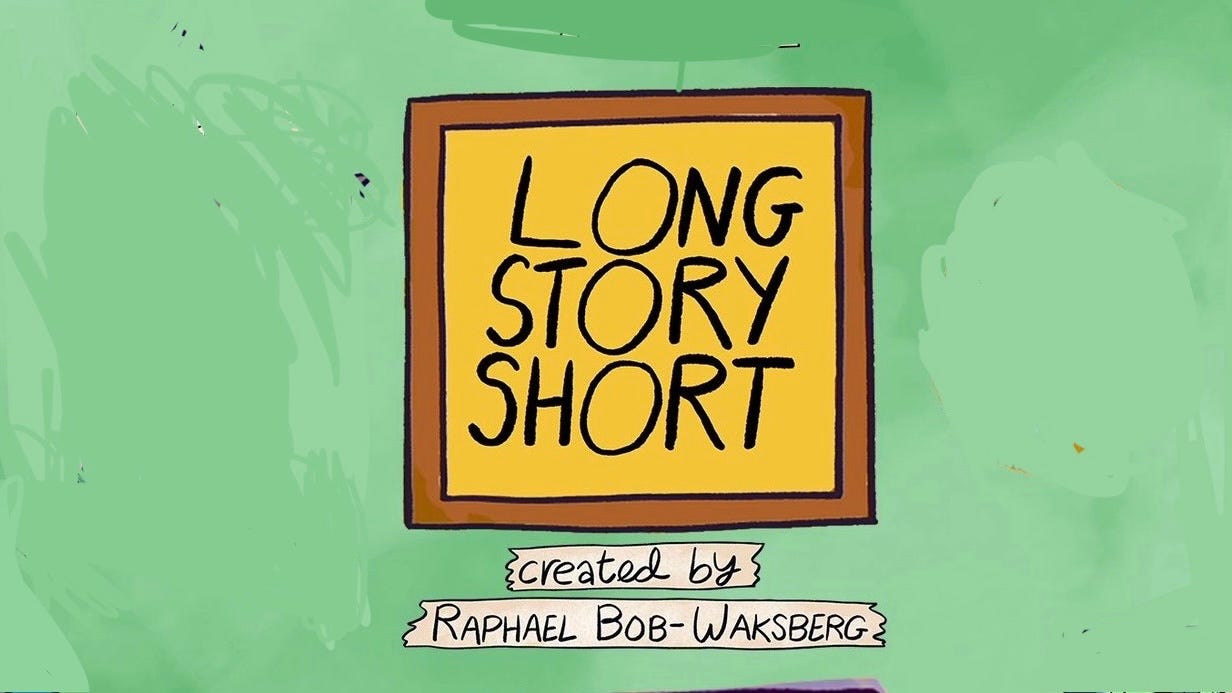Season Review: Long Story Short Season One
Overview (Spoilers Below):
A dysfunctional family’s shared history, inside jokes, and old wounds are explored. Three siblings —Avi (Ben Feldman), Shira (Abbi Jacobson), and Yoshi (Max Greenfield) — experience ordinary adult events while looking back on their highly religious childhood.
Our Take:
Families often experience a range of highs and lows that test their bonds and challenge their way of living, particularly those who grow up with strong religious beliefs. These experiences, however, are what strengthen their connections, forging deeper understanding and resilience among members. The Schwooper family is no exception to this dynamic, particularly the siblings, whose adult lives are just as complicated as their childhoods. This encapsulates the latest adult animated sitcom from Raphael Bob-Waksberg, who achieved success through his acclaimed Netflix series, BoJack Horseman, and his collaboration with Kate Purdy on Undone. Admittedly, I hadn’t watched BoJack Horseman, but I had been hearing fantastic word-of-mouth about it being a pinnacle of adult animation, particularly in its later seasons, due to its profound themes and emotional depth. Maybe someday I’ll get around to binge-watching it, but until then, we’ve got Bob-Waksberg’s exploration of the complexities of family life to tide us over.
The sitcom, titled Long Story Short, centers on the Schwoopers, a middle-class family navigating the trials and tribulations of life while weaving their Jewish heritage into their everyday experiences. The show primarily focuses on the three siblings—Avi, Shira, and Yoshi—as they grapple with adult responsibilities, personal growth, and the interplay between their religious beliefs and modern life. Consisting of ten episodes, the first season employed a nonlinear narrative style that explores the siblings’ coming-of-age stories through various time periods. This storytelling technique enabled a deeper exploration of their relationships, such as Shira’s request for Avi to donate sperm for her girlfriend, Kendra. This plotline delved into Shira’s childhood trauma, which had strained her relationship with Avi, illustrating how past events continue to influence present dynamics. However, it’s not without its share of humor, which coincides with the drama, including Yoshi’s particular job of selling mattresses inside tubes. At first glance, the episodes might seem like a collection of random scenarios typical of sitcoms. However, they were actually interwoven to depict the family’s complex and sometimes dysfunctional bond amid their everyday problems and Jewish traditions, all presented in a non-chronological order.
The only exception is Kendra, who has her own adventure in the seventh episode, “Kendra’s Job”, which focuses on her management job at a children’s entertainment center. On paper, it appeared to be more of a standalone story, but it turned out to be anything but. The episode is clearly about Kendra’s struggles with balancing her management job with personal relationships, leading her to make a heartbreaking decision to maintain her reputation. However, it’s more about her conversion to Judaism, a decision stemming from her guilt over firing someone she knew from her childhood. In a way, this episode enriched Kendra’s character arc, much like the others did for the siblings, demonstrating the show’s commitment to developing even its secondary characters beyond mere comic relief.
The use of its nonlinear structure contributed to its easygoing pace while maintaining the dynamic essence of the characters’ chemistry. Sure, it runs the risk of foreshadowing specific outcomes, but the real enjoyment comes from the journey itself. The unfolding of events is filled with the kind of turmoil and drama that mirrors the unpredictability of real life, peppered with surprises that breathe life into the characters. While not without its narrative setbacks, Long Story Short effectively explores the intricate web of life and relationships, be they familial or otherwise, while providing thoughtful commentary on Jewish traditions in a mature and often humorous manner. Some adult animated comedies exploit these religious representations for the sake of shock value and vulgarity, which can be hit or miss depending on the execution. However, Long Story Short isn’t like the other comedies that rely solely on adult jokes. Instead, it utilizes them to portray the humanity and growth of the siblings, with the humor deriving from life’s challenges rather than crudeness.
BoJack Horseman stood tall as one of the pinnacles of adult animation storytelling, particularly for its social commentaries and rich character development. With Long Story Short, Raphael Bob-Waksberg aims to further demonstrate the appeal of life’s ups and downs through the art of animation. The result is a heartwarming and effectively structured series that balances its adult humor with charm and drama to provide a familial story worth telling. The animation has an issue with a cookie-cutter style seen in other recent animated projects, but it has enough merits in its art style to compensate for any moments of stiffness. Supported by its talented voice cast and compelling sitcom plots, Long Story Short may not reach the narrative and emotional heights of BoJack Horseman, but it showcases Bob-Waksberg’s keen understanding of adult animation as a medium that transcends mere vulgarity and offensive humor. With a second season already in the works, we can expect the return of the Schwooper family for some more family drama and laughs sooner or later.























"There are also other characters that come and go (also owned by the Warner Bros. Discovery conglomerate media company)."
Huh. Is that just referring to other characters from the show itself, or is this implying that the new season is going to have cameos from other WBD IPs